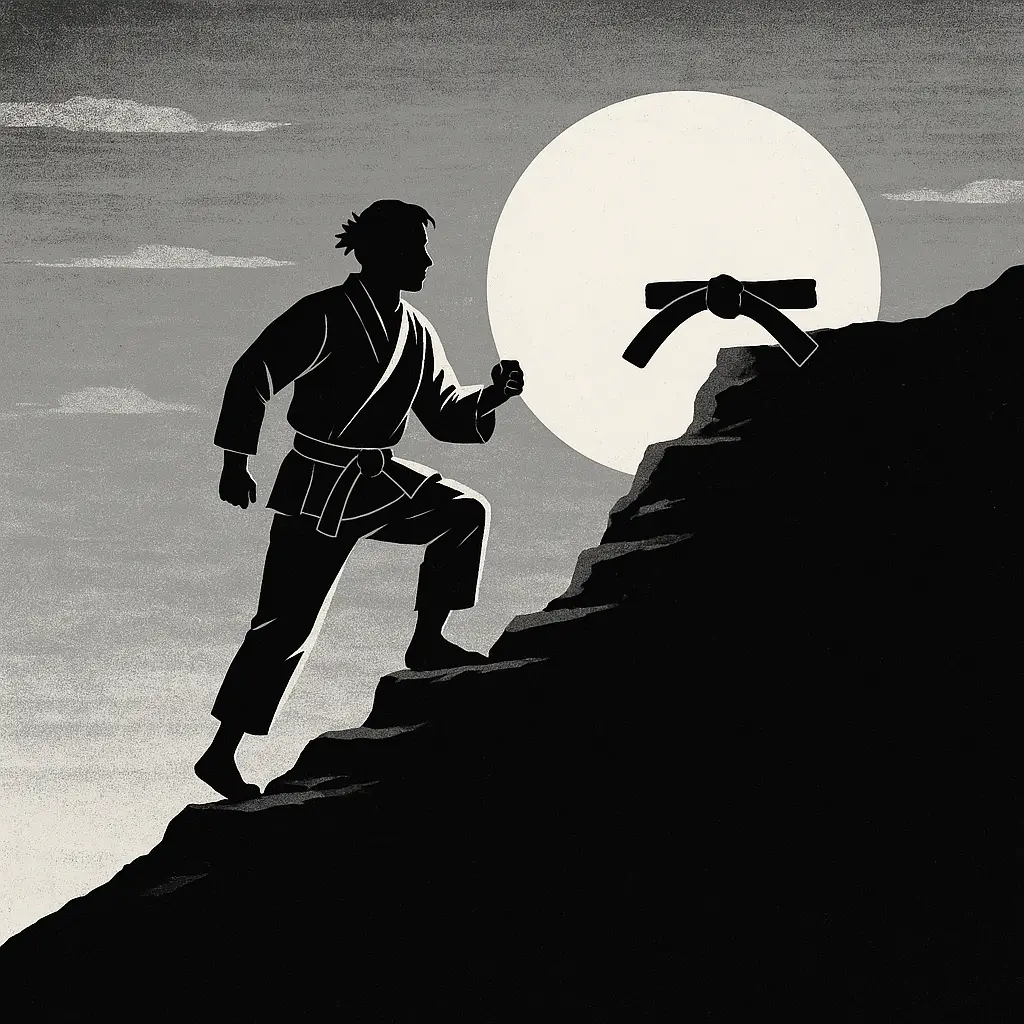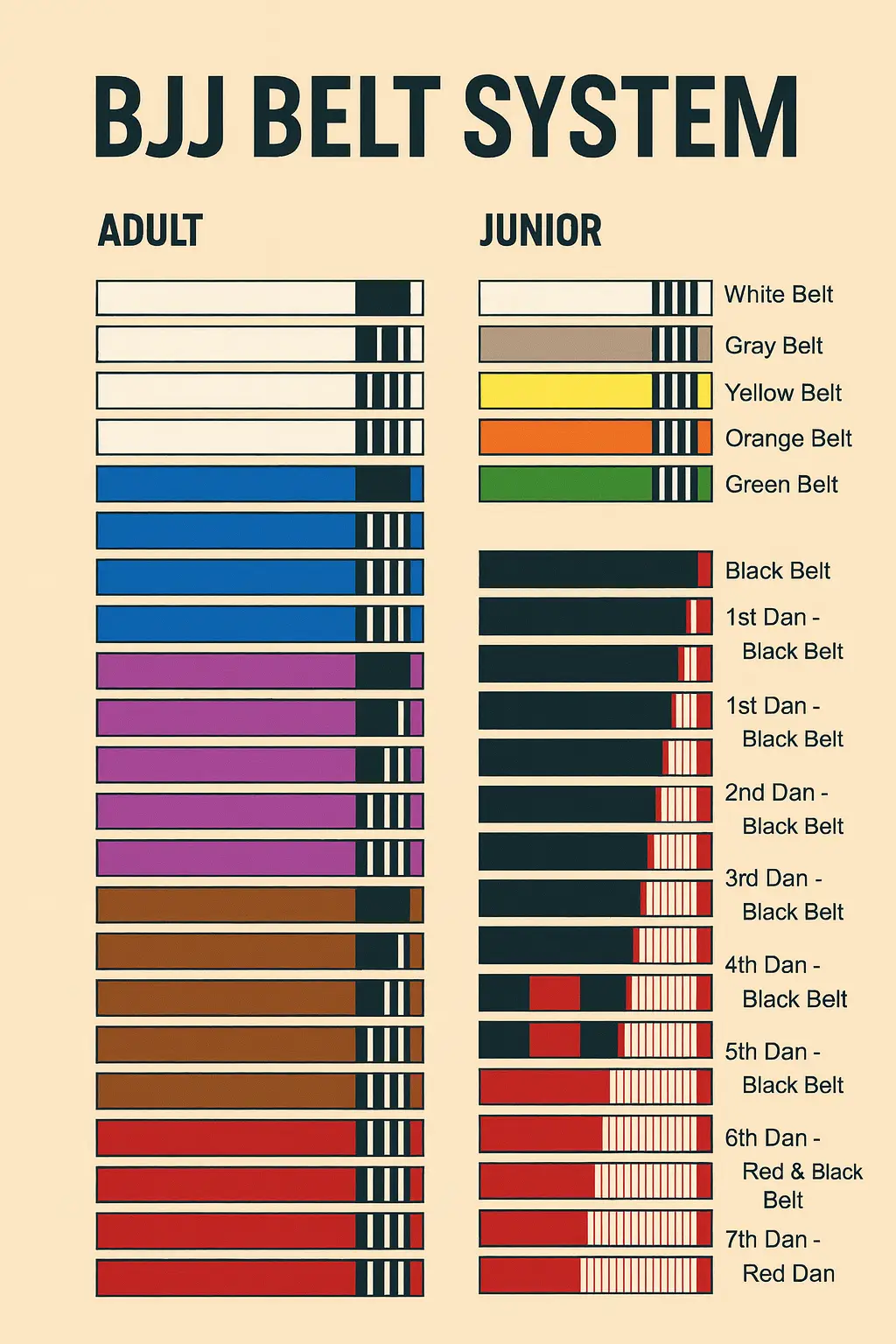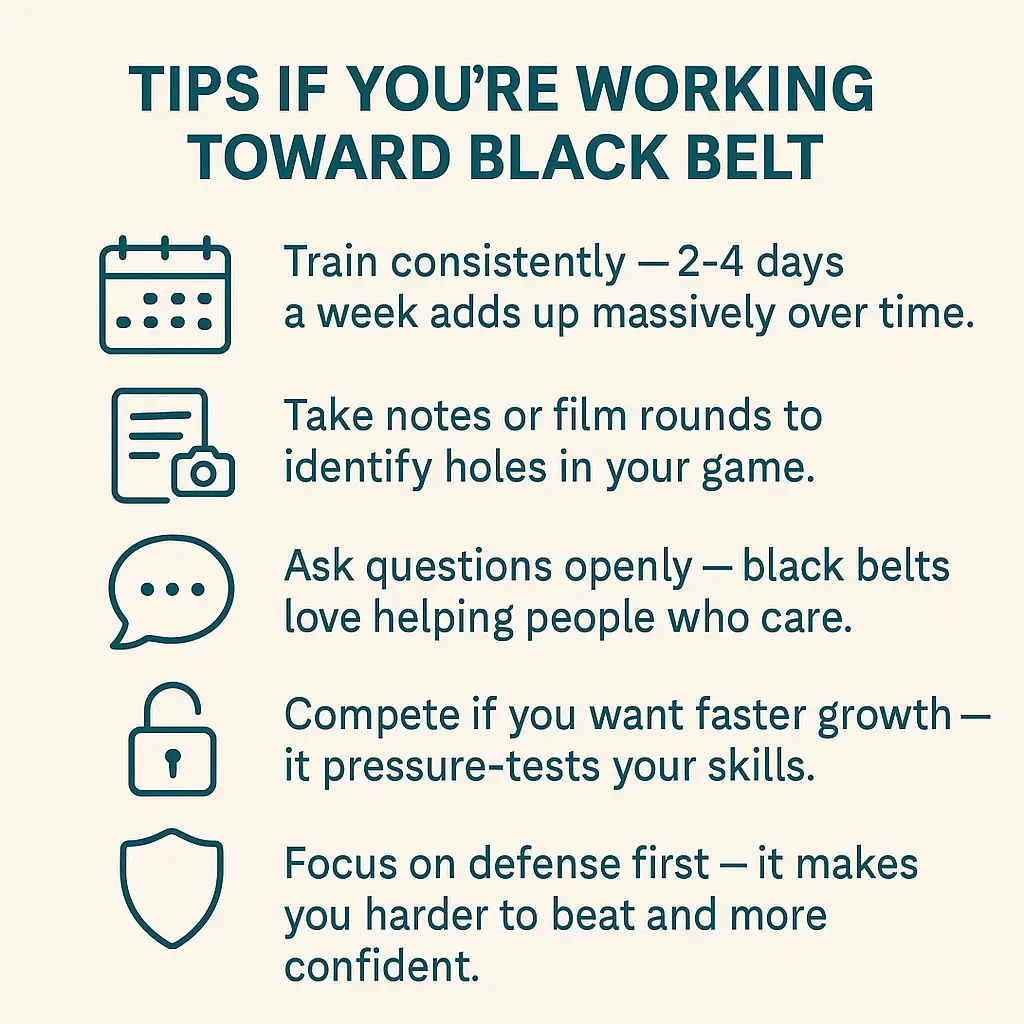Brazilian Jiu-Jitsu is a sport that allows individuals to completely reshape their lives for the better. This sport teaches you several lessons that can be applied on or off the mats. The pursuit of the Brazilian jiu-jitsu black belt is noble, respectable, fun, and all the more challenging. The average person will not make it to this point because the average person will give up when times get tough. Do you want to be above average? Let’s look at the black belt in BJJ a little more closely!
Getting a Black Belt in BJJ
The Brazilian jiu-jitsu black belt is the highest rank someone can receive in their time spent as a jiu-jitsu athlete. On average it takes about 10 years to accomplish. Jiu-jitsu is a sport that is pretty strict in the way it promotes its students through the ranks. The likelihood that someone makes it a black belt is slim when you look at the overall number of people that give up either at the white or blue belt stage. If you stay the course, dedicate yourself to the sport, and bury the excuses that come up, making it to this stage is only a matter of time.
Most people that make it to this stage in BJJ are avid competitors. Although no one needs to compete, we believe that it is the best way to showcase your skills and improve your game. Until you put techniques under competition, you will never know if they work.

How Long Will This Take?
As we stated earlier in the article, a black belt in jiu-jitsu takes at least 10 years to get. This is going to be a long time to be dedicating yourself to something but the journey to this point will teach you many lessons along the way. If you are worried about how long something will take to achieve, we bet our money that you won’t make it in any endeavor. You have to fall in love with what you are doing, the pursuit to get better, and the processes that will ultimately help you achieve your goals.
Promotion Criteria for BJJ Black Belts
Earning a black belt in BJJ isn’t based on time alone, it’s based on a combination of skill, application, character, and consistent commitment to training. Every academy has its own culture and standards, but the core criteria are mostly universal. A black belt represents someone who has spent thousands of hours refining techniques, solving problems during live sparring, and developing the ability to help others learn the art.
Most instructors look for several key pillars before deciding someone is ready for this rank. A black belt is trusted to represent the art, the gym, and the lineage so the bar is intentionally high. This is not meant to be some kind of checkbox.
Core Promotion Criteria
Technical Mastery
You should have a deep, functional understanding of:
- Fundamental techniques from every major position
- High-percentage submissions, sweeps, transitions, and escapes
- Body mechanics, pressure, balance, and timing
- Ability to troubleshoot and adjust techniques for different body types
Your technique doesn’t need to be perfect — but it needs to be reliable, efficient, and teachable.
Application Under Resistance
A black belt isn’t just someone who knows the moves. It’s someone who can consistently apply them:
- During rolls with all belt levels
- Under pressure
- Against bigger, stronger, or more athletic partners
- In competition (optional, but extremely helpful)
If your technique breaks down the moment someone resists, you’re not quite there yet.
Positional Dominance & Defense
By black belt level, you should be:
- Difficult to submit
- Hard to hold down
- Able to escape bad positions reliably
- Capable of controlling and progressing through dominant positions
Defense is just as important as offense maybe more.
Strategy, Timing, and “Mat IQ”
Black belts develop a level of calmness and awareness that takes years to build. They can:
- Predict reactions
- Force predictable responses
- Adjust game plans mid-roll
- Conserve energy and apply pressure efficiently
This “fighting intelligence” is one of the clearest signs of a black belt.
Teaching Ability
Many gyms expect future black belts to:
- Help new students
- Assist with classes
- Explain concepts clearly
- Demonstrate techniques safely
Even if you never plan to teach professionally, you should be able to pass on the art.
Character & Leadership
You don’t get a black belt just for being tough. You get it for being trustworthy. Instructors look for:
- Humility
- Respect for training partners
- Consistency
- Emotional maturity
- The ability to create a safe environment on the mats
How Coaches may Judge if you are Ready
Coaches promote based on patterns they see over months and years not one good training day. They’re watching how you move, how you think, how you train, and how you treat others on the mats. Even if they don’t say it out loud, most coaches share similar criteria when deciding who is ready for a black belt.
- You’re Hard to Submit
- You Can Handle All Belt Levels
- Your Technique Works Against Resistance
- You Show Strategy, Timing, and Composure even from the worst positions
- You lift the room up
- Consistency
- You do not rely on just your strength
- You are ready to teach (you don’t HAVE to but could if needed or wanted to)
What Does it Mean to have a Black Belt in BJJ?
Everyone will tell you different meanings that the Brazilian jiu-jitsu black belt holds, which is fine. The general things that most people will say about the BJJ Black belt are the following:
- Technical mastery over the skill of BJJ
- Strategic & excellent at problem-solving
- Grasps positional dominance expertly
- Has a plethora of submission chains
- Strong defense & the ability to escape almost all situations
- Rolling IQ / Timing / Flow
- Coaching ability
- Character and consistency
Making it to this stage is not for the faint of heart, you have to have some serious conviction to get to this point in BJJ. Jiu Jitsu is not like every other martial art, the people that make it to the highest stage are there for a reason. The black belts are the backbone of this community and are tasked with the responsibility to pass on their knowledge to the generations to come.
BJJ is a sport that is rapidly growing due to the popularity of the UFC exploding during the 2020’s pandemic, massive celebrities joining the sport, and benefits that get touted on social media like Instagram.

The BJJ Belt System: Timeline
At this point, we have written about the BJJ Belt system several times but to fill you in this is what you can expect your progression to look like through the sport:
| White Belt | Time Spent Here: 1 -2 years |
| Blue Belt | Time Spent Here: 2 – 4 years |
| Purple Belt | Time Spent Here: 1.5 – 3 years |
| Brown Belt | Time Spent Here: 1 – 2 years |
| Black Belt | Time Spent Here: Final Belt – Rank Up By Degrees |
Black Belt is not end of the road
Reaching your black belt in Brazilian Jiu-Jitsu isn’t a finish line a lot of BJJ black belts say it is the start of a new phase. The belt represents mastery of the fundamentals, but it also opens the door to deeper learning, more responsibility, and a renewed understanding of just how vast the art really is.
Many people say they felt like white belts all over again once they were promoted, because the expectations shift from “learning the moves” to understanding timing, strategy, teaching, and evolving your style.
The black belt is a symbol of what you’ve accomplished, but it also reminds you that there’s still a lifetime of growth ahead.
What Changes when you become a black belt?
Earning your black belt changes more than just the color around your waist. You’re expected to train with more intention, help others on the mats, and carry yourself as a leader. Rolls often become more technical and less chaotic, and you’ll find yourself focusing on refinement instead of collecting techniques.
You also become someone others look to for guidance whether you planned on being a teacher or not. The biggest shift is internal: you start to see jiu-jitsu as a lifelong practice rather than a ladder to climb.
Black Belt Salary & Career Opportunities
Earning a black belt doesn’t guarantee a full-time career in jiu-jitsu, but it does open the door to opportunities that weren’t available before. Many black belts choose to keep their day jobs and teach part-time, while others make a living entirely through the sport. It all depends on your goals, your academy, and how involved you want to be in the jiu-jitsu community.
Making Money as a Black Belt in BJJ
For black belts who want to earn money through jiu-jitsu, these are the most common paths:
Teaching at an Academy
- Assistant or full-time instructor roles
- Kids classes, fundamentals, and beginners
- Paid hourly or per class
Private Lessons
-
Typically $40–$150/hour depending on experience and competition background and demand.
Opening Your Own Gym
- Income from memberships, merchandise, seminars, and sometimes belt testing fees.
- Higher earning potential but requires business skills.
Seminars & Workshops
-
Traveling to teach can pay $300–$2,500+ per seminar for well-known instructors and the demand that people have from wanting to learn from you.
Digital Opportunities
- Instructionals, YouTube, online courses, coaching, and membership sites.
- One of the fastest-growing income streams for black belts
Brazilian Jiu-Jitsu is a martial art that truly changes who you are as a human. The lessons you will learn about both life and yourself on your journey to becoming a black belt will amaze you like it continues to amaze us!




